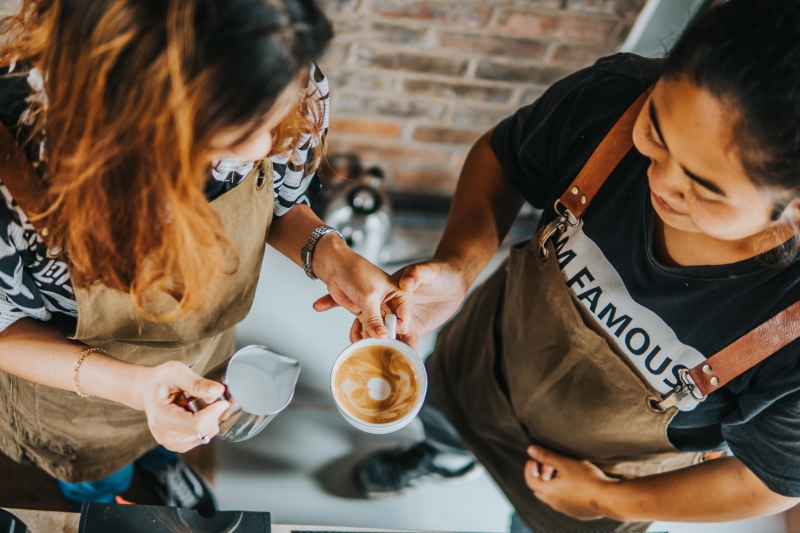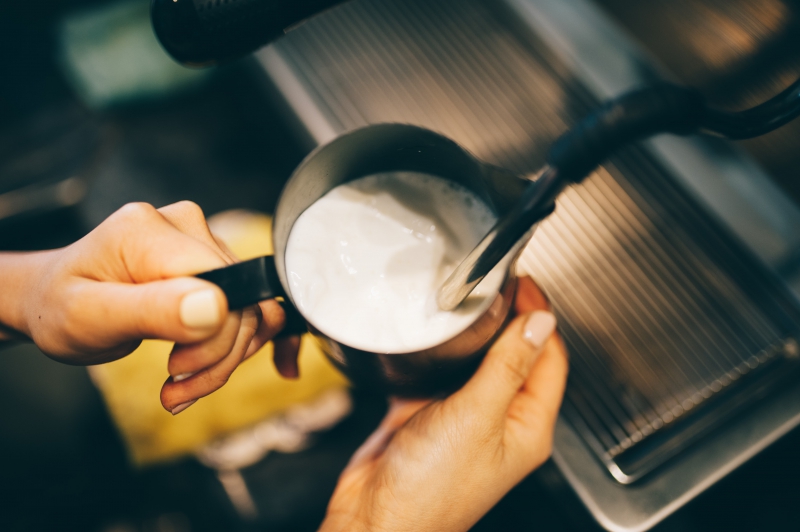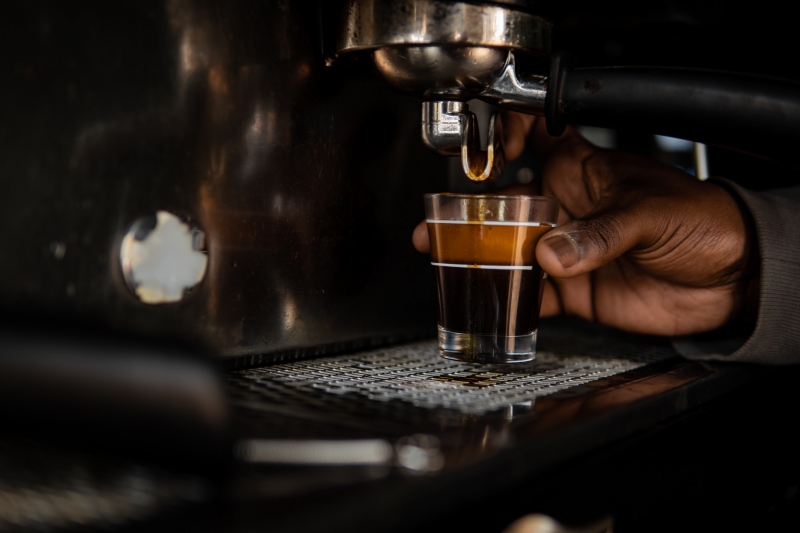The Pursuit of Practice
The willingness to improve must come with the acceptance that practice is the only way forward.
Words by Imile de Villiers
Have you ever wondered what makes your favourite local coffee spot better than the rest? Chances are it has something to do with a focus on training and solid practice. These aren’t revolutionary ideas, but the simple things matter when it comes to ensuring a consistently delicious cup. Imile de Villiers, who has extensive barista training experience, enlightens us on the benefits of practice, both at home and in the cafe space.

Mohammad Ali famously said “I hated every minute of training, but I said, ''Don't quit. Suffer now and live the rest of your life as a champion.” I am no boxer, and I have two chipped teeth to prove it, but boxing (very) recreationally showed me how fit and how good the professionals really are. While the particulars of any professional athlete’s exercise routines might be secret, the fact that exercise and practice is a necessary part of that routine is not even up for debate.
When was the last time you worked on your coffee skills at home? I can tell you right now that this impacts on your consistency. Because you can bet your last few beans that the coffee in your hopper has changed from the time you bought it. This probably means you should have adjusted your grinder or how much coffee you’re using in your brew, to get the optimal results. Intentionally noting the steps that get you there, are a part of the ‘practice makes perfect’ adage.
Now in the cafe setting, practice might seem like a crazy idea for a hard-working barista - I mean, if you steam 50L of milk and make 300 espressos everyday, what else do you need to practice? And yet, the cafes that are consistently winners and nominees at the Coffee Magazine Awards, are the ones who consistently offer staff training.
“But steaming milk is like riding a bike, once you can do it, you can do it!” I hear you saying.

Image credit: Unsplash Jack Hishmeh
Yes, but in the case of a number of branches with several baristas, there needs to be regular calibration. How much milk goes down the drain, or how much milk gets resteamed? There is definitely room for improvement.
“But I know how to set a grinder and make espresso.” Yes, but do you set your grinder daily? Regular tasting of under- and over-extracted coffee will better attune you to slight sourness or astringency and speed up your calibration routine while narrowing your variance of espressos served. New techniques and tools are emerging all the time to ensure better consistency across all 300 espressos all day, everyday. It’s not as easy as the consumer might think to achieve this, even when 10 000 hours have long since been logged (more on that later).

Photo credit: Unsplash Chamoré Nel
What skills do you appreciate in your local barista? Basic skills of making espresso and steaming milk; knowledge of coffee and a friendly demeanour. I can tell you that a cafe owner values a barista who can calibrate the grinder and has some amount of tasting ability to go along with that; understand coffee theory to know why certain techniques are used and is able to train new baristas; and above all, a barista that is consistent, which means minimising waste and assuring the customer they will always get what they paid for.
Practice and training definitely doesn’t mean retraining a barista (or yourself) from scratch on a bi-monthly basis. The training necessary in the pursuit of practice might be a lot simpler than you think.
Did you know that pilots use checklists before take-off? Ever wondered why? Surely after thousands of flying hours you know how to fly a plane, right? Atul Gawande explains in The Checklist Manifesto how a simple checklist before takeoff has reduced incidents in aviation and how his advocacy for checklists before surgery reduced complications.
So does a checklist count as training? Definitely.
Can running through a simple checklist at the start of the week make a difference? Definitely.
Common checklist examples for a cafe team:
“What is our espresso recipe?”
“What do we do when it starts running too fast?”
“What is the protocol when a customer sends back a coffee?”
Reinforcing these kind of actions to everyday issues in the cafe will increase the likelihood of them happening. I am making the assumption that you’re working with a standard espresso recipe and that all the staff know it, or at least about it. If anything is not standardised, that is where you start your training. If you don’t know for a fact that all your baristas use the same measure of hot chocolate in your drinks, then I can guarantee that they don’t. And 3 teaspoons is not a measure. Invest in a scoop and make sure it gets used. Go through your whole menu one drink at a time and when you are satisfied that everyone knows how to make everything, then you can go into maintenance mode with a few basic checklists.
Practice is not good enough if it isn’t deliberate. Steaming 50L of milk everyday doesn’t make you better at steaming milk, in fact, you might just be reinforcing bad habits. At the peak of my performance as a barista, I knew exactly how much milk to pour for any drink combination to not have any waste and I’ll brag about that until the ice caps melt and global warming kills all the coffee trees. I had to constantly be attentive to how much milk I was portioning before steaming and how much was left after pouring the drink. Look into your jug after pouring a cup. Is there milk left? You can do better. In terms of espresso, a simple scale is a great way to keep track of your shots and help with setting your grinder so you at least have one consistent variable while you are experimenting with technique.
Which brings us to the next necessity of practice: feedback. Getting immediate, constant feedback during practice is essential. Seeing how much milk you have left over tells you if you need to improve. Watch a bartender making cocktails and you might see them put a drop on the back of their hand to taste the cocktail before serving (gross! It’s more hygienic to use a straw to drop into your mouth). That is immediate feedback that we simply don’t have when making espressos, just imagine the caffeine jitters from tasting every coffee you make! So even 300 espressos made daily by busy baristas does not count as practice if nothing can be learnt from it! You’ll have to schedule time to deliberately taste espressos. Maybe this is why home enthusiasts can improve so quickly, as you basically taste every drink you make and know if something has gone wrong in extraction. Deliberate and with immediate, relevant feedback - that’s the only way to practice and improve.
Malcolm Gladwell, in his book Outliers, popularised the 10,000 hour rule for becoming an expert in any given field (I told you we’d make it back). However, in a recent podcast episode of Rethinking with Adam Grant, Malcolm said he doesn’t think the 10,000 hours are as important as what is necessary to make 10,000 hours a possibility in the first place. Why do Grammy winners always thank their mom? You can’t do it without a support structure and the right environment.
If you are a home barista, it’s tough to improve if your household inhabitants are the only measure of your skill and if you are a lone barista at a coffee shop, then you really have your work cut out for you. Who is your coffee community? Join a coffee club, or start one if you must. Visit other coffee shops, new coffee shops, and the popular coffee shops and talk to every barista behind every bar. Whether you are aiming for 10,000 hours or not, you won’t build up any amount of hours if you aren’t putting some systems in place to help you achieve it.
Now let’s not forget that we all have different obstacles - I was lucky to have a flexible job that allowed me to take a part time job as a barista; at a later stage I was taking public transport to get to work - taxis were faster, but the bus was more conducive to listening to podcasts and reading. What can you do to make it easier for yourself to learn and improve? What small changes can you make to introduce a better learning environment for a team at a cafe, or for yourself at home? Take stock of what you have and what you need, so you can start working towards what you want.
The bus I used to take passed by the boxing gym, and let’s just say that since I’ve had my own transport I haven’t been punched nearly as much, but I haven't had any opportunities to work on my right hook either.